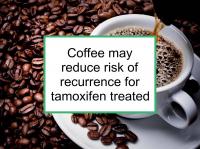Coffee drinking has variously been reported to have either a small positive or negative association with breast cancer risk, or no association at all. Coffee has numerous components that have the potential to influence breast cancer risk and development, including caffeine, caffeic acid, trigonelline, kahweol, and various other compounds.
For example, coffee has been reported to increase the risk of breast cancer among women with benign fibrocystic breast disease and reduce it among BRCA mutation carriers. Large population studies tend to mask such individual differences by combining the results of groups of women for whom coffee drinking might reduce breast cancer risk with those for whom coffee might increase risk. Studies that have investigated the possible influence of coffee consumption on hormone receptor status have produced inconsistent results.
The effect of coffee consumption on breast cancer risk depends in part on a woman's CYP1A2 and CYP2C8 genes, which play a crucial role in the metabolism of both estrogen and coffee. Different alleles (variants or alternate forms of the genes) can have different effects. Coffee has been found to protect C-allele carriers of the CYP1A2 gene against breast cancer by reducing breast volume. Coffee consumption has also been shown to slow the growth of estrogen receptor positive (ER+) tumors in women with the CYP1A2*1F A/A genotype.
Now a new study has reported that moderate to high coffee consumption is associated with significantly decreased risk of recurrence in tamoxifen-treated Swedish breast cancer patients.
Coffee is not recommended during chemotherapy
Coffee should not be consumed during chemotherapy since it might reduce the effectiveness of doxorubicin and other anthracycline chemotherapy because of its caffeine content. There is also some preliminary evidence that coffee could reduce the effectiveness of paclitaxel and other taxane chemotherapy as a result of its caffeic acid content.
Latest research finds coffee can enhance tamoxifen
The study referenced at the beginning of this news story was designed to investigate whether coffee influences breast tumor characteristics and risk of early recurrence in light of CYP1A2 and CYP2C8 genotypes and type of breast cancer treatment. The CYP1A2 and CYP2C8 enzymes contribute to the metabolism of both tamoxifen and caffeine. The study included 634 Swedish breast cancer patients. Participants were divided into low (up to one cup per day), moderate (two to four cups), and high (at least five cups) coffee consumption groups. CYP1A2*1F and CYP2C8*3 were genotyped. The women were followed for a median of 4.92 years.
The proportion of estrogen receptor negative (ER-) tumors was found to increase with increasing coffee consumption. However, moderate to high coffee consumption was associated with lower likelihood of estrogen receptor positive/progesterone receptor negative (ER+/PR-) status compared to low consumption.
The 310 patients with ER+ tumors who were treated with tamoxifen and who consumed at least two cups of coffee per day experienced a 60% reduced risk of recurrence during follow up compared to those with low intake. Low coffee intake combined with at least one CYP1A2*1F C-allele (35 study participants) or CYP2C8*3 (13 study participants) was found to be associated with more than three- and six-fold risks of recurrence in tamoxifen-treated patients compared to other tamoxifen-treated patients.
The authors conclude that moderate to high coffee consumption is associated with significantly decreased risk of early recurrence in tamoxifen-treated patients in this population. Coffee consumption also appears to modify hormone receptor status. The authors comment that new recommendations regarding coffee consumption during tamoxifen treatment may be warranted if the study results are confirmed.
Please see our articles on coffee and what to eat during tamoxifen treatment for more information.
